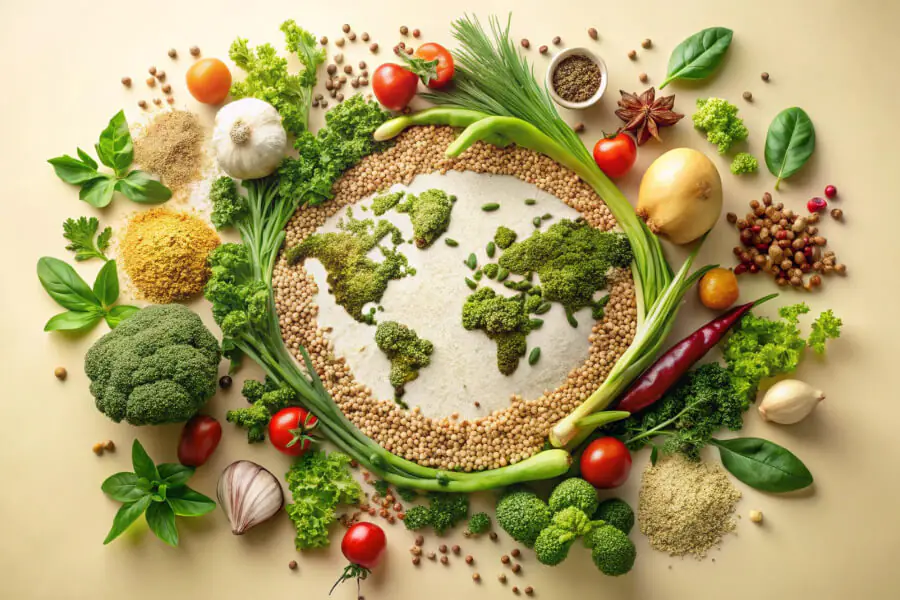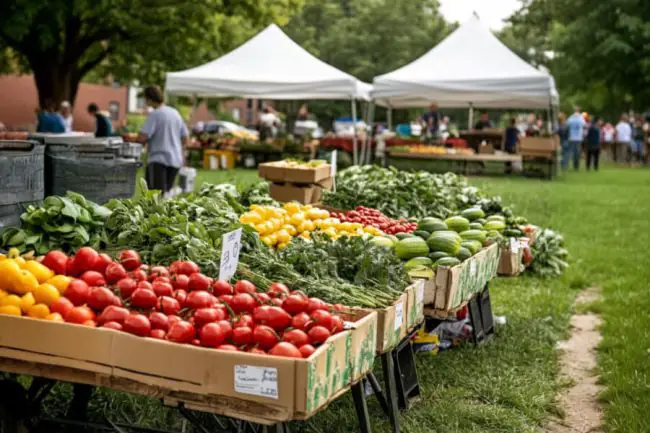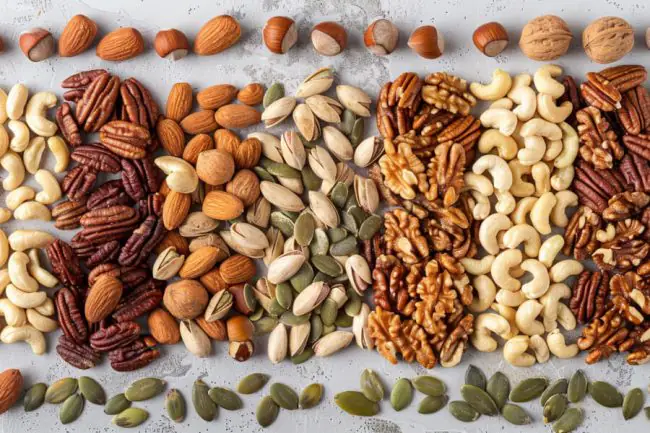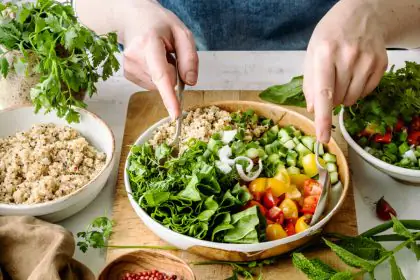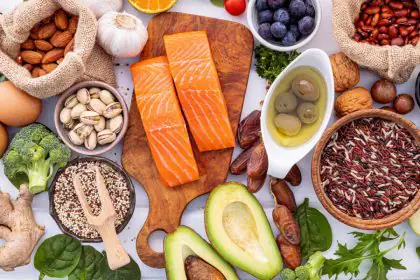Eating more sustainable foods is not just a passing trend it’s a conscious lifestyle choice that promotes environmental health and personal well-being.
By integrating these foods into your daily meals, you reduce your carbon footprint, support local ecosystems, and enjoy nutrient-rich ingredients.
This guide will introduce you to 10 sustainable foods that are both good for you and good for the planet.
The Impact of Sustainable Foods on the Environment and Health
Sustainable foods are produced using methods that protect natural resources, reduce pollution, and limit greenhouse gas emissions. These foods are often locally sourced, and organic, and require fewer resources to grow, helping to preserve biodiversity.
By choosing sustainable foods, you’re not only nourishing your body with healthier options but also contributing to the fight against climate change.
Sustainable eating promotes long-term health and environmental sustainability, as these foods are usually less processed, fresher, and packed with essential nutrients.
Whether it’s through plant-based proteins, locally grown produce, or eco-friendly farming practices, sustainable foods offer a path to a better, more balanced way of eating.
The Benefits of Choosing Locally Sourced Foods
Choosing locally sourced sustainable foods reduces the energy required for transportation and storage. Local produce is often fresher, more flavorful, and keeps more nutrients. It also helps support local farmers, contributing to the sustainability of local economies.
By focusing on locally grown options, you’ll be consuming more sustainable foods while reaping health benefits from fresher, more nutrient-rich meals.
Organic Berries
Berries like strawberries, blueberries, and raspberries are packed with antioxidants and essential vitamins.
Choosing organic berries ensures that they are grown without harmful pesticides, protecting both your health and the environment.
Organic farming supports soil health and biodiversity, making berries one of the most delicious sustainable foods you can add to your diet.
Leafy Greens from Farmers Markets
Leafy greens such as spinach, kale, and arugula are packed with vitamins A, C, and K.
Buying these greens from local farmers’ markets not only ensures freshness but also supports small-scale, sustainable agriculture.
Locally grown greens are often less processed and avoid the long transportation routes of store-bought options, making them a perfect choice for sustainable foods.
Plant-based proteins like Lentils and Tofu
One of the most effective ways to eat more sustainably is by choosing plant-based proteins.
Lentils, beans, and tofu are some of the top sustainable foods, offering an excellent source of protein, fiber, and iron.
These foods require far fewer resources, such as water and land, than traditional meat production, making them highly efficient in terms of sustainability.
Lentils, in particular, are known for improving soil health by fixing nitrogen, which helps future crops grow.
Sustainable Seafood Choices
When it comes to sustainable foods, responsibly sourced seafood can make a big difference. Go for seafood with the Marine Stewardship Council (MSC) certification to ensure it has been harvested sustainably.
Fish like sardines, mussels, and wild-caught salmon are great choices since they are lower in the food chain and reproduce quickly. Eating sustainable seafood provides essential omega-3 fatty acids while supporting healthy marine ecosystems.
Nutrient-dense superfoods such as Chia Seeds
Chia seeds are not only incredibly nutrient-dense but are also considered one of the most sustainable foods. They require minimal water to grow and are packed with omega-3 fatty acids, fiber, and protein.
These tiny seeds can be added to smoothies, oatmeal, or baked goods, offering an easy and delicious way to add sustainable foods to your diet.
Seasonal Vegetables and Fruits from Local Farms
Eating with the seasons is a hallmark of sustainable eating. Seasonal vegetables and fruits from local farms are fresher, more nutritious, and have a smaller environmental footprint due to reduced storage and transportation needs.
Choose seasonal sustainable foods like summer zucchinis or winter squash to enjoy vibrant flavors while supporting local farmers and ecosystems.
Eco-Friendly Nuts and Seeds
Nuts and seeds, such as almonds, walnuts, flaxseeds, and sunflower seeds, are some of the best sustainable foods available. However, it’s essential to choose varieties that are grown in eco-friendly ways.
For example, almonds grown in water-scarce areas can have a large environmental impact, so choosing more water-efficient nuts like walnuts or flaxseeds is a better option.
These nuts and seeds provide a healthy source of fats, protein, and fiber, making them a nutritious and sustainable choice.
Ancient Grains like Quinoa and Farro
Ancient grains like quinoa and farro are among the most versatile and sustainable foods. They require fewer resources to grow than highly processed grains and are often more resilient to changing weather conditions.
Packed with protein, fiber, and essential nutrients, these grains make for an excellent base in a variety of dishes, from salads to grain bowls, while supporting sustainable farming practices.
Environmentally Friendly Meat Alternatives
For those who are cutting down on meat but not ready to go fully plant-based, environmentally friendly meat alternatives like tempeh, seitan, and even lab-grown meat are excellent sustainable foods to try.
These options provide the texture and protein of traditional meat at a fraction of the environmental cost.
By swapping a few meat-heavy meals for plant-based alternatives, you can significantly reduce your carbon footprint.
Sustainable Dairy and Alternatives
If dairy is part of your diet, choose sustainable options like organic, pasture-raised dairy products.
Organic dairy farms use more eco-friendly methods that prioritize animal welfare and reduce environmental damage.
Alternatively, you can switch to plant-based dairy alternatives such as almond, oat, or coconut milk, which are excellent sustainable foods.
These alternatives often have a lower environmental impact and are easier to integrate into a sustainable lifestyle.
Tips to Add Sustainable Foods in Your Daily Meals
Adding sustainable foods to your daily routine doesn’t have to be complicated. Here are some simple tips to help you make the shift:
- Plan meals around seasonal ingredients: Use seasonal fruits and vegetables as the base for your meals to ensure you’re eating the freshest and most eco-friendly options.
- Embrace plant-based meals: Aim to include more plant-based proteins in your diet, such as lentils, beans, or tofu, which are not only nutritious but also highly sustainable foods.
- Support local farmers: Purchase your produce from farmers’ markets to ensure you’re supporting local, sustainable agriculture.
Understanding Food Labels and Certifications for Sustainability
When shopping for sustainable foods, be sure to look for certifications that indicate eco-friendly practices:
- USDA Organic: Indicates that the food was grown without harmful pesticides or synthetic fertilizers.
- Fair Trade Certified: Ensures that the food is produced sustainably and that the farmers are paid fairly.
- MSC (Marine Stewardship Council): Confirms that the seafood was sustainably sourced and harvested responsibly.
Engaging in Sustainable Food Practices at Home
Aside from choosing sustainable foods, you can engage in sustainable practices at home by:
- Composting food waste to reduce the amount of organic matter that ends up in landfills.
- Reducing food waste by planning meals carefully, using leftovers, and storing food properly.
- Growing your own produce: Even a small herb garden can reduce your reliance on store-bought produce and help you eat more sustainably.
Conclusion
Sustainable foods offer a simple yet powerful way to positively impact the environment while maintaining a healthy and nutritious diet.
By adding these 10 sustainable foods to your meals, you’ll be taking steps toward a more eco-friendly lifestyle.
Whether it’s choosing local produce, embracing plant-based proteins, or going for organic dairy, every decision you make contributes to a more sustainable future.
FAQs
What are some sustainable food practices?
Sustainable food practices include eating locally, reducing food waste, and adding plant-based proteins to your diet.
What are the most sustainable foods to eat?
Some of the most sustainable foods include lentils, quinoa, leafy greens, and sustainably sourced seafood.
What is a sustainable food diet?
A sustainable food diet focuses on foods that are resource-efficient, locally sourced, and environmentally friendly.
How can we practice sustainability in the food industry?
Sustainability in the food industry can be promoted through responsible sourcing, reducing waste, and supporting ethical farming practices.

